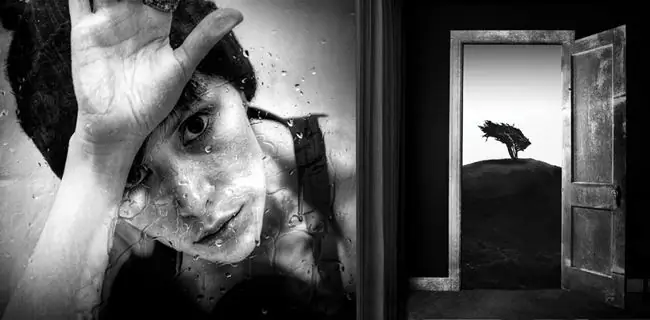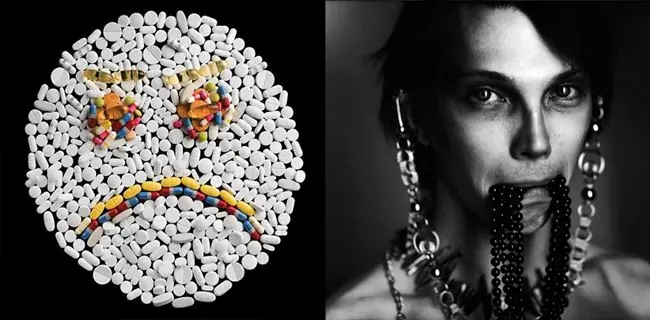- Author Adrian Jeff jeff@psychologosportal.com.
- Public 2023-12-17 05:06.
- Last modified 2025-01-24 14:09.
Somatization. Is it a symptom of a disease of the body or suffering of the soul?
How to distinguish somatization from disease? How to understand whether a symptom in each particular case is a consequence of a serious illness or the result of the transformation of psychological stress into physical discomfort, malaise, or a change in bodily sensations?
The opinion of a doctor who completed the training "system-vector psychology" Yuri Burlan
Our body is inseparable from mental processes, these interconnected states sometimes appear in a very interesting and unexpected way in life.
There is such a phenomenon as somatization - the transformation of our, most often unconscious, psychological distress (anxiety, feelings, fears, depression, depression) into bodily symptoms (“soma” in Latin means “body”).
Symptoms of somatization can be very diverse - fatigue and weakness, headaches, dizziness, nausea, urinary disorders, lump in the throat, feeling short of breath, various pains and much more.
How to distinguish somatization from disease? How to understand whether a symptom in each particular case is a consequence of a serious illness or the result of the transformation of psychological stress into physical discomfort, malaise, or a change in bodily sensations?
In the case of somatization, the patient's complaints of various pains and discomfort do not give a picture of a specific disease and, as a rule, are contradictory. In addition, when examining the subject of the disease, all indicators are most often normal.

This is how a difficult situation arises between the doctor and the patient: the doctor reports that the disease has not been found, - the patient is perplexed: “But I'm not making this up, I really feel bad! There must be a reason! You just couldn't find her! And, disappointed, he goes to another doctor. So, in search of his illness, he bypasses many specialists, but the conclusion remains the same, and the person comes to the conclusion that doctors do not know how to do anything and no one is able to help him.
Attempts by some doctors to explain that the reason for the sensations may be hidden in the psyche is usually denied by the patient himself. A person is not aware of his psychological discomfort, he tries to avoid additional pain, is afraid to lose at least those moral compensation that his "illness" gives him. Many patients do not want to take responsibility for what is happening to them, change themselves, their lives. This behavior is a way of psychological protection.
The main method of treatment is psychotherapy, the purpose of which is to establish connections hidden for the patient himself between his emotional conflicts and the occurrence of somatic symptoms. There are so many psychotherapeutic techniques that temporarily relieve a person's condition, but none of them gets to the real roots of a person's emotional problems, roots that are hidden deep in the unconscious.
Remaining incomprehensible, these mechanisms continue to operate, and only in the case of their awareness does a person have the opportunity to actually change their states and, as a result, get rid of bodily manifestations of mental discomfort.
Real life example
A woman comes to the appointment with a complaint of chest pain, dizziness, nausea and weakness. Her eyes are dull, her whole appearance expresses depression. I ask her. She says that symptoms in different variations appear immediately after waking up.
Morning is the most difficult time for her. She describes her feelings upon awakening, and I understand that the coming day is weighing heavily on her simply because there is nothing to fill it with. This thought is exhausting, she must expend colossal energy to force herself to get out of bed and start a new day, because all she really wants at that moment is to get under the covers and sleep all her life …
- Why was it given to me, this life? she asks longingly.

- Nothing pleases you? What do you like to do?
- In general, I like to do needlework, cook, read … but … why ??? Everything seems so Senseless! What will change if I don't? Or will I? Nothing! I take a book in my hands and understand that this is just a consolation …
- And you need SENSE, - I continue for her.
- Yes! - reviving, she confirms … - Life seems so EMPTY … thoughts of suicide involuntarily come …
In this woman, her unrealized sound vector speaks. Not finding fulfillment in everyday life, he stresses, the sound does not allow him to fill the desires of other vectors. So she puts off knitting and books, feeling all her actions are meaningless. Her anal vector falls into a state of stupor - inability to initiate action.
- When the children lived with me, it was easier, but now … it's lonely … For whom should I cook, eat, clean?.. Besides, in autumn and winter it is always more difficult … the days are so short, and the nights are long, sometimes fear will come and I lose my composure, I can't do anything about it … I feel so helpless … Doctor, I need sedatives …
Her unfilled stressful visual vector is realized in fears and anxiety …
I listen to her and understand that the reason for her bodily sensations, various vague pains, nausea, weakness and dizziness was despair from the sense of the meaninglessness of existence. The reason is that she cannot express herself in any way: all the desires that could inspire her to action, all her actions, which, if she did them, could give her the happiness of realization and completely different sensations, are broken into one inevitable thought: What for? What is the meaning of all that is happening?..”(this is how depression expresses itself in the sound vector).
These states overtook her at the age of 30, by now she has been on antidepressants and sedatives for 20 years, not believing in herself and the possibility of happiness, desperate to find answers to her questions. She is dependent on her psychiatrist, but he also does not give answers … only temporary relief …
I ask her if she would like to understand herself, what is happening to her, where do such thoughts come from, what are they conditioned by and what to do with them? How do I change my states? How can you feel the joy of life again? Her eyes liven up, interest in a spark of life is reflected in her entire appearance. "Of course!" she says.

Nothing is accidental - no thoughts, no feelings. All reactions are subject to strictly defined patterns and are Predictable.
There is a real opportunity to learn to see and understand all your states and, thanks to this, make them manageable to some extent (sufficient to change your whole life). Learn to understand your desires and know how to fulfill these desires. Become able to understand the causes of fears and say goodbye to them forever - through deep awareness, through the direction of natural properties in the right direction.
We can treat various symptoms of our conditions, expect relief from doctors and psychologists, but if we want to be the masters of our life, we want to live it knowingly and with pleasure, then we need to take responsibility for knowing our essence. This can be done at full-time psychological trainings conducted by Yuri Burlan.
Another example from life
The story of a 45-year-old woman. I went to the doctor with a complaint of a lump in my throat, a feeling of suffocation. It was examined and no physical disturbances were found, but the feeling of discomfort and breathing disturbance progressed, and swallowing disturbance was added. When observing this woman, her fussy movements and veiled emotional blackmail were striking. She clearly provoked others to notice her, to pay attention to her. In general, depressed, withdrawn and aloof, she was somewhat animated, talking about her feelings, expecting sympathy and understanding.
More detailed studies in the hospital for physical abnormalities also did not clarify what was happening. It was understood that the symptoms were not caused by diseases of the body as such, but by the mental state of the patient. Further treatment took place in a psychiatric clinic, where she was beneficially influenced by privacy, confidential communication with a doctor, sedatives and antidepressants. After a month, the suffocation symptoms disappeared.
If only forever!.. But no, it was only a temporary relief. The woman returned home to her daily routine, and soon her bodily symptoms appeared again. Now the stomach refused to take food. She grew thin and weakened before her eyes. All the care of the house and of herself was taken over by her caring husband. She was taken to the city awaiting a verdict - cancer, but all tests were normal, and now she is again undergoing long-term treatment in a psychiatric clinic. Everything repeated itself.

Her later life consisted of recurring periods of illness with alternating symptoms: urinary disorders, headaches, difficulty sleeping, a lump in her throat … The psychiatric clinic became her second home.
Consideration of the situation from the point of view of Yuri Burlan's "System-Vector Psychology" helped to understand what exactly was happening to this woman.
Vectorally, this woman is a visual dermatologist. An unrealized stressful sound vector knocked her out of the usual rhythm of life, causing a state of depression, as well as sleep disturbances and frequent headaches. In a depressed state, she could not adequately fill the desires of other vectors (after all, in such a state, all ordinary affairs seem meaningless, life is empty and every step is unnecessary), and their manifestations acquired a pronounced painful character.
The skin vector manifested itself as a fuss and a need to strictly control and limit everything (and by the way, which is completely systemic: with her skin twitching, she brought her husband with an anal vector to a heart attack).
The only content of the underdeveloped vision was the desire to receive attention, expressed anxiety and unconscious fears. So the disease was her escape from reality. On the one hand, the quiet room and the desired loneliness in the psychiatric clinic temporarily compensated for her sound states. On the other hand, her visual vector was filled, enjoying the attention of doctors and loved ones.
As a doctor, I observe that the main contingent of people with somatization symptoms are skin and anal visual people. The presence of a sound vector in a poor state causes symptoms arising from depression, lack of interest in life. A person complains of lethargy, apathy, fatigue, headaches, drowsiness, or, conversely, difficulty sleeping.
Skin people are concerned about their health, they easily adapt pain. In the absence of adequate implementation, skin people learn to enjoy pain, it can become a kind of filling for them (masochistic tendencies are only in the skin vector). In addition, the skin body and psyche are flexible and easily accept, transfer to the body the states inspired by the fears of the visual vector.
The fearful visual vector is always afraid for its life and is very sensitive to what is happening. The visual emotions of fear and anxiety can easily be transformed by the cutaneous vector (flexible and adaptive in nature) into a painful symptom. The spectator literally instills illness in himself. And he is also able to heal with a placebo.
The anal vector contributes to the onset of symptoms (more often these are abdominal pains, digestive disorders) with its stress and lack of fulfillment, primarily a feeling of resentment and difficulties with adaptation. I think that in their case the symptomatology may more often than in the case of dermato-visual people be the result of psychosomatic diseases.
You can learn more about the nature of vectors and their effect on our psychological state and health at the free online lectures of Yuri Burlan. You can register here.






